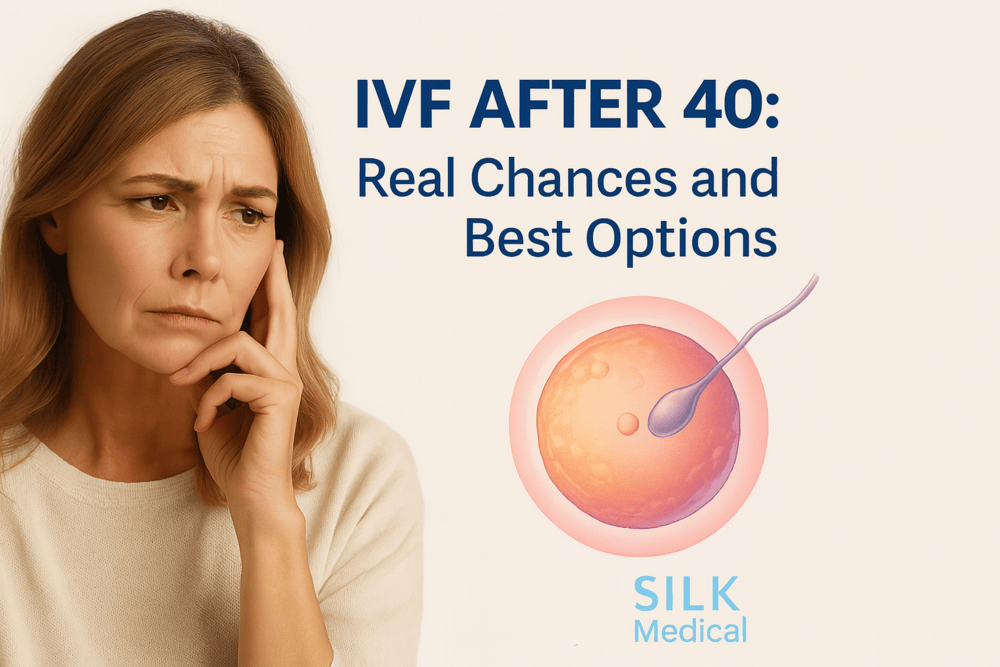Fertility declines with age. Most women know this. But many are unaware of how sharply it drops after 40 and what that means for IVF. This article breaks down what matters: actual success rates, the role of donor eggs and genetic testing, and the programs available at SILK Medical.
Why Age Matters in IVF
A woman’s egg count begins to decline in her early 30s. After 35, the drop becomes more rapid. By 40, both the number and quality of eggs decrease significantly. This leads to lower fertilization rates, higher miscarriage risk, and a greater chance of chromosomal abnormalities in embryos. IVF cannot reverse age-related decline in egg quality. It can only work with what is available.
According to the American Society for Reproductive Medicine, a woman’s chance of natural pregnancy falls to less than 5% per month by age 40, and IVF success with own eggs drops to single digits. However, using donor eggs from younger women can restore IVF success rates to about 50%.
IVF After 40: What the Numbers Say
Women over 40 face much lower success rates using their own eggs. At SILK Medical, women under 35 using their own eggs reach pregnancy in 70% of cases. That number drops sharply for women in their 40s. Many will need multiple cycles, and even then, the chance of live birth remains limited.
Donor Eggs as a More Reliable Option
Eggs from young, medically screened donors offer a major advantage. They are more likely to result in healthy embryos and successful pregnancies. Age no longer becomes the limiting factor when using donor eggs. For women over 42, this is often the most realistic option.
At SILK Medical, donor egg IVF ranges from $8,000 to $10,400 depending on the number of embryo transfers and whether PGT-A testing is included. Both fresh and vitrified donor eggs are available, with a wide selection of phenotypes.
PGT-A: Why It Matters More After 40
Preimplantation Genetic Testing for Aneuploidy (PGT-A) helps identify embryos with the correct number of chromosomes. Embryos with abnormalities are more common as maternal age increases. Testing helps avoid failed transfers and early miscarriages by selecting embryos with a higher likelihood of implantation.
SILK Medical includes PGT-A for up to 5 embryos in most IVF and surrogacy packages. More embryos can be tested if needed.
Program Options at SILK Medical for Women Over 40
SILK Medical offers several approaches, depending on individual medical history and reproductive potential:
- IVF with own eggs: For women with encouraging test results (e.g., AMH, ultrasound), a full cycle including PGT-A is $7,000.
- IVF with donor eggs: Pricing starts at $8,000 for a single transfer and goes up to $10,400 for multiple transfer attempts with genetic screening.
- Surrogacy with donor eggs: For patients unable to carry a pregnancy due to medical reasons, SILK offers surrogacy programs from $38,900 to $70,000. All include egg donation, genetic testing, surrogate care, and legal support.
Every case begins with a proper evaluation. Success depends on the starting point.
Planning and Timeline
Patients traveling to Georgia for IVF typically stay for around two weeks. Ovarian stimulation begins on day two of the cycle. Egg retrieval happens about ten days later. Embryo development takes five to six days, and PGT-A results arrive in three to four weeks.
In donor egg cases, patients can usually leave after sperm collection and donor selection. SILK Medical handles the remaining steps. Embryo transfer can happen during the same visit or later as a frozen cycle.
Surrogacy programs take more time and include medical screening, legal agreements, surrogate matching, and pregnancy supervision. SILK coordinates all steps and keeps patients informed.
Choosing a Strategy That Matches Reality
IVF after 40 comes with clear limits. Trying with your own eggs is possible in some cases, but odds decline rapidly with age. Donor eggs can dramatically improve the chance of success. Genetic testing adds another layer of safety. For women unable to carry a pregnancy, surrogacy remains a valid and structured path.
SILK Medical offers programs that address each of these needs without overselling the results. The clinic uses evidence, not hopeful language, to guide each patient toward a practical and effective plan.


